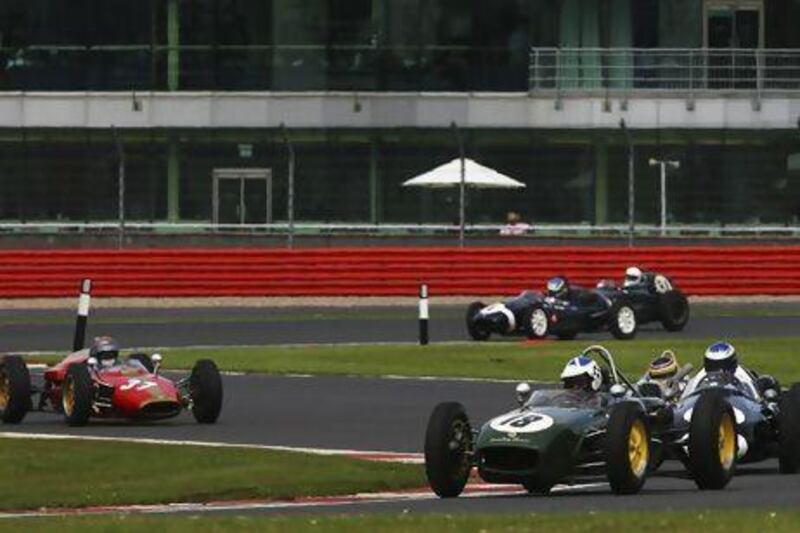This year's Silverstone classic-car racing festival, which is the world's biggest and ends today, comes in the wake of a spectacularly successful year for the classic car market.
The investment research company the Historic Automobile Group International (Hagi) estimates the global market for classic cars priced at more than £100,000 (Dh564,928) is now worth more than £30 billion and growing.
Hagi says the global value of the classic car market grew by just under 28 per cent per cent in the year to the end of last month, increasing by 11.8 per cent in the past quarter alone on the previous quarter.
While the value of global equities has suffered, Hagi says the market for collectors' automobiles has continued to gain, driven by private treaty and auction sales for classic cars by makers such as Porsche, Ferrari, Mercedes-Benz and Bugatti, particularly old racing models.
This month, a Mercedes-Benz W196R became the most expensive car ever sold at auction, fetching US$26.45 million, representing a total price of $29.6m when auction charges and other costs are included.
The five-times Formula One World Champion Juan Manuel Fangio drove the car to victory in two F1 races, the 1954 German and Swiss Grand Prix.
Bonham's the auction house that sold the car, says the deal reflects a healthy and rising market.
"The classic car market is showing good performance across the market and across the globe," says Tim Schofield, the director of Bonham's UK cars department.
Modern transport also plays a part in the growth.
"The global market for cars is expanding, particularly as it now typically only costs a few thousand pounds to air-freight a car from one continent to another," says Mr Schofield.
According to Bonham's, classic car investment in the United States is even bigger than in Europe, with particular interest being shown in cars made before the Second World War such as pre-1940 Duesenbergs and so-called "muscle cars" powered by V8 engines such as Dodges and Corvettes.
"It is a good time for classic cars. In the 1989-90 recession we saw a decline in the trading of classic cars," says Parry Chana, a partner at the UK-based classic car restorer Hilton & Moss.
"But during this recession, classic cars have gone from strength to strength, outperforming equities and property, which was adversely affected by high interest rates."
However, for many classic car owners, the spectacular investment performance compared with other asset classes is secondary. Genuine enthusiasts want to use their vehicles to take part in international events such as Silverstone.
Mr Schofield cites a rare 1955 Maserati 300S that was sold at auction for £4m this month - almost double the previous record price for an example of the marque.
"A car like that almost automatically gives the owner an entry ticket into all the best automobile events on the globe," he says.
Vintage cars can also be surprisingly easy to value for those familiar with the market.
"For most vehicles, valuation can be very accurate," says Mr Schofield.
"For something totally unique, it can be a little more difficult; in that case, I would look at what condition it was in and what did its peers make."
Other factors potentially increasing the value of a rare car can include unique features, such as the left-hand drive on the Aston Martin DB5 that was driven by James Bond in the 1965 movie Goldfinger.
According to Bonham's, the car fetched an additional 15 to 20 per cent simply because it was left-hand drive.
Altogether, just over 1,000 of the model were ever built including 123 convertibles and estate cars.
So who would not be attracted by a solid investment that is outperforming equities and property and also represents an automatic passport to a glamorous and jet-setting lifestyle?
Unfortunately, the classic car market is fraught with pitfalls for the uninitiated. It should be remembered it is at heart simply a used car market populated with, albeit none-too-shady, used-car salesmen.
"Potential investors should be wary of companies they may not have heard of claiming to restore cars," says Mr Chana.
"An investor needs to be careful about buying a car that needs major works."
Mr Schofield believes potential investors should also bear in mind that classic cars can be expensive to run.
"A decrepit [Jaguar] E-Type, for example, would require a great deal of maintenance and any car will obviously need to be garaged."
Bonham's reports there is also a vast and growing internet-based market in classic cars - and that holds particular dangers for the unwary.
"Many enthusiasts believe that they can gain an advantage over the market by studying it online - this may not always be the case as everyone can have internet access," says Mr Schofield.
"In any case, they will still be buying a real car with all its wear and tear and faults."
The investment potential of classic cars also differs across the many various marques and models.
"There is a vast variety of classic cars. Classic cars range from Morris Minors to Maseratis," says Mr Schofield.
"But not everyone sells a car for £17.5m to £20m ... At the low end it is possible to buy an MGB GT for as little as £1,000 to £2,000."
However, the lower down the classic car market buyers go the more risky the investment. According to Hilton & Moss, it is necessary to spend between £250,000 and £500,000 on a car in order to purchase anything like a secure investment.
But for real enthusiasts such as those at Silverstone this weekend, the true attraction of these beautiful machines lies in getting behind the wheel.
"At the end of the day it should really be about getting from A to B in style," says Mr Schofield.





